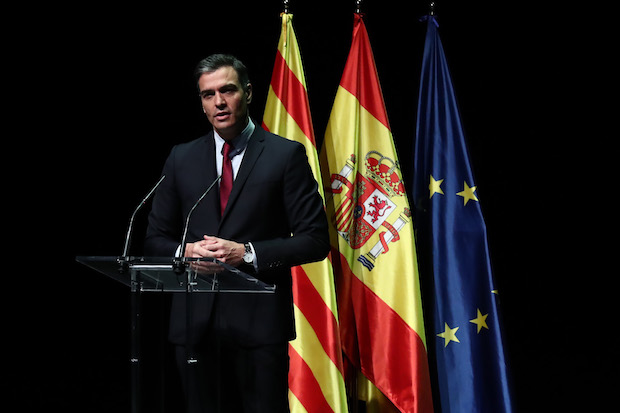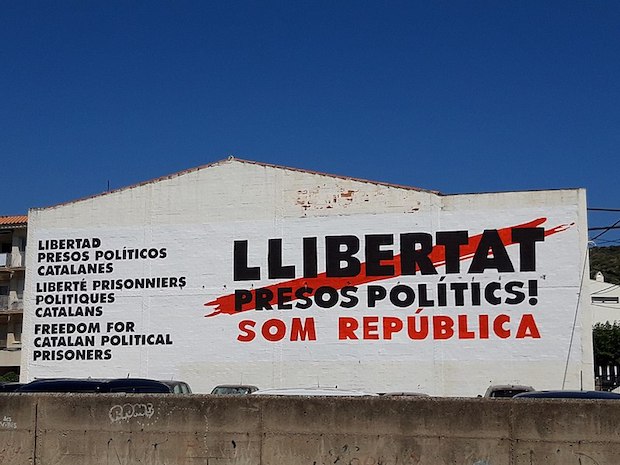Evangelicals in Catalonia and the rest of Spain analyse the government's decision to free the convicted leaders of the Catalan independence process.
![Pro-independence and European Union flags on a building in Barcelona. / Photo: [link]Egor Myznik[/link], Unsplash, CC0](https://cms.evangelicalfocus.com/upload/imagenes/60d4808bd69db_EgorMyznik.png) Pro-independence and European Union flags on a building in Barcelona. / Photo: [link]Egor Myznik[/link], Unsplash, CC0
Pro-independence and European Union flags on a building in Barcelona. / Photo: [link]Egor Myznik[/link], Unsplash, CC0
The Spanish President, Pedro Sánchez, has announced the approval of pardons for the leaders condemned for the process of independence of Catalonia at the well-known Liceu theatre in Barcelona.
It is no coincidence that Sánchez has chosen one of the iconic spaces of Catalan culture to make an announcement of such a political dimension, nor that he quoted the Catalan poet Miquel Martí i Pol in his speech: “Som on som (we are where we are), and we are dealing with the incalculable sum of everyone's miscalculations in the midst of a reality that none of us want, but which we have made together”, said Sánchez.
The Spanish President stressed concepts such as “harmony” and “reconciliation”, even when a member of the pro-independence organisation Arran in the audience interrupted, shouting “independence is the only solution”.
“The reason for the pardons is that they are useful for coexistence”, defended Sánchez. “I am convinced that getting these nine people out of prison, who represent thousands of Catalans, is a message of harmony. We are materially taking nine people out of prison, but we are symbolically adding millions to coexistence”, .
The approval of the pardons has been at the centre of the political debate in Spain in recent months. According to a poll published by Ipsos, the decision does not convince the majority of the Spanish population (53%), while in Catalonia more than two thirds (68%) are in favour.
The Spanish opposition parties PP, Vox and Ciudadanos have announced that they will appeal the decision, although in legal matters such as this the appellants are usually parties directly related to the pardoned person and who may be affected by the measure of grace. None of the three parties comply with this conditions.
Meanwhile, the Parliamentary Assembly of the Council of Europe approved this Monday in Strasbourg a non-binding resolution in favour of granting pardon to the imprisoned leaders of the independence process.
Following approval by the Parliament, the decision must be published in the Official State Gazette, signed by King Philip, and then the Supreme Court will settle the remainder of the sentence. It will be resolved during the course of this week. By then, the nine imprisoned politicians will have been in prison for more than three and a half years.

The political arena has shown its huge differences on the issue, with the government speaking of conciliation and the main opposition parties questioning the decision and blaming it on electoral motivation.
“Opinions are diverse in Catalonia as they are in the rest of Spain”, says Jaume Llenas, national coordinator of the Graduate Bible Groups (GBG) and the Lausanne Movement in Spain. “However, just as a majority of the population in the rest of Spain may be against the pardon, in Catalonia the polls say the opposite. The pardons loosen relations within Catalan society, although they may strain relations in other territories”.
Catalan pastor Julio Pérez underlines that “the pardons may mean a clear and necessary détente in the conflict between one part of Catalonia and the rest of Spain”. Although for him “the acts carried out between September and October 2017 were extremely serious and unconstitutional”, Pérez considers that the release of the independence leaders is “a step in the right direction”.
On the contrary, lawyer Juan Miguel Torres considers that the decision is “a political concession, motivated by partisan interests, which has nothing to do with the rule of law”.
For Xesús Manuel Suárez, a doctor and evangelical politician, the measure represents a first attempt by the Spanish government “to try to find a way out of the conflict”. “It is useful that a Spanish government finally decides to take a political initiative that goes beyond trying to subdue the opposition by force”.
“We elect politicians to make balanced diagnoses, to work to understand the other side, to look for ways to meet and process conflicts properly, to build bridges and create agreed solutions. Entrenching oneself under the banner of the indissoluble unity of the homeland recruits votes, but in the medium and long term it solves nothing. Pardons are finally something different than usual”, he points out.

During his speech at the Liceu, president Sánchez referred to the pardon as “a measure of grace” included in the Constitution since 1870. Since 1996, 10,652 pardons have been granted in Spain, according to the Civio Foundation.
“Pardons are not so much a measure of justice as a measure of grace taken for political convenience. The judiciary administers justice, the executive branch measures moments of opportunity within society and acts politically”, explains Llenas.
In addition to the opposition parties, one of the institutional voices that has spoken out most strongly against pardons has been that of the Supreme Court judges, who believe that “there is no sign of repentance” from the convicted politicians, and that requests for pardons by third parties “blur the meaning of the pardon”.
According to Suárez, “the Supreme Court could have said the same thing without such a political baggage in the explanation of its sentence. Once again, it subtly re-enters the political debate”.
“It is surprising that it returns to the same thing after the successive slaps on the wrist by European judicial institutions on this very issue”, he stresses, alluding to the endorsement of the pardons by the European Court of Human Rights and the recent declarations against the sentence of the Spanish Supreme Court by the Parliamentary Assembly of the Council of Europe in Strasbourg.
Torres, on the other hand, underlines that the decision to pardon the independence leaders “deeply undermines the rule of law” and challenges the submission of public authorities to the law.
“The reports of the Public Prosecutor's Office, which says that it would even be possible to apply the provisions of article 102 of the Constitution that forbids pardons being granted to members of the government, are relevant, because in this case [the pardon] is being granted to those who were part of a regional government and are currently part of political parties that support the government”, says the lawyer.
Llenas recalls that “half of the pardons that have been granted in the last decade had a the negative report of judges or prosecutors, however they were granted”.
“The courts have already done their job when they judged the case. It is not up to them to intervene now as this is the responsibility of another branch of government, the executive. It is logical to disagree with the political measures taken by the executive, and this is expressed in democratic countries when citizens vote”, he concludes.

Las opiniones vertidas por nuestros colaboradores se realizan a nivel personal, pudiendo coincidir o no con la postura de la dirección de Protestante Digital.
Si quieres comentar o